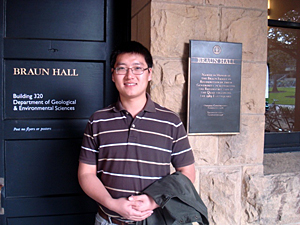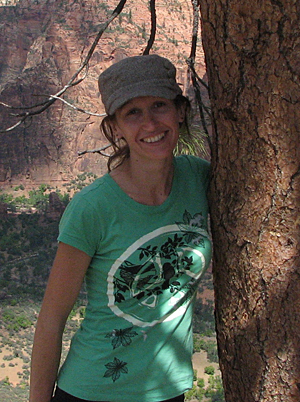ADVERTISEMENT
- Rozovsky wins prestigious NSF Early Career Award
- UD students meet alumni, experience 'closing bell' at NYSE
- Newark Police seek assistance in identifying suspects in robbery
- Rivlin says bipartisan budget action, stronger budget rules key to reversing debt
- Stink bugs shouldn't pose problem until late summer
- Gao to honor Placido Domingo in Washington performance
- Adopt-A-Highway project keeps Lewes road clean
- WVUD's Radiothon fundraiser runs April 1-10
- W.D. Snodgrass Symposium to honor Pulitzer winner
- New guide helps cancer patients manage symptoms
- UD in the News, March 25, 2011
- For the Record, March 25, 2011
- Public opinion expert discusses world views of U.S. in Global Agenda series
- Congressional delegation, dean laud Center for Community Research and Service program
- Center for Political Communication sets symposium on politics, entertainment
- Students work to raise funds, awareness of domestic violence
- Equestrian team wins regional championship in Western riding
- Markell, Harker stress importance of agriculture to Delaware's economy
- Carol A. Ammon MBA Case Competition winners announced
- Prof presents blood-clotting studies at Gordon Research Conference
- Sexual Assault Awareness Month events, programs announced
- Stay connected with Sea Grant, CEOE e-newsletter
- A message to UD regarding the tragedy in Japan
- More News >>
- March 31-May 14: REP stages Neil Simon's 'The Good Doctor'
- April 2: Newark plans annual 'wine and dine'
- April 5: Expert perspective on U.S. health care
- April 5: Comedian Ace Guillen to visit Scrounge
- April 6, May 4: School of Nursing sponsors research lecture series
- April 6-May 4: Confucius Institute presents Chinese Film Series on Wednesdays
- April 6: IPCC's Pachauri to discuss sustainable development in DENIN Dialogue Series
- April 7: 'WVUDstock' radiothon concert announced
- April 8: English Language Institute presents 'Arts in Translation'
- April 9: Green and Healthy Living Expo planned at The Bob
- April 9: Center for Political Communication to host Onion editor
- April 10: Alumni Easter Egg-stravaganza planned
- April 11: CDS session to focus on visual assistive technologies
- April 12: T.J. Stiles to speak at UDLA annual dinner
- April 15, 16: Annual UD push lawnmower tune-up scheduled
- April 15, 16: Master Players series presents iMusic 4, China Magpie
- April 15, 16: Delaware Symphony, UD chorus to perform Mahler work
- April 18: Former NFL Coach Bill Cowher featured in UD Speaks
- April 21-24: Sesame Street Live brings Elmo and friends to The Bob
- April 30: Save the date for Ag Day 2011 at UD
- April 30: Symposium to consider 'Frontiers at the Chemistry-Biology Interface'
- April 30-May 1: Relay for Life set at Delaware Field House
- May 4: Delaware Membrane Protein Symposium announced
- May 5: Northwestern University's Leon Keer to deliver Kerr lecture
- May 7: Women's volleyball team to host second annual Spring Fling
- Through May 3: SPPA announces speakers for 10th annual lecture series
- Through May 4: Global Agenda sees U.S. through others' eyes; World Bank president to speak
- Through May 4: 'Research on Race, Ethnicity, Culture' topic of series
- Through May 9: Black American Studies announces lecture series
- Through May 11: 'Challenges in Jewish Culture' lecture series announced
- Through May 11: Area Studies research featured in speaker series
- Through June 5: 'Andy Warhol: Behind the Camera' on view in Old College Gallery
- Through July 15: 'Bodyscapes' on view at Mechanical Hall Gallery
- More What's Happening >>
- UD calendar >>
- Middle States evaluation team on campus April 5
- Phipps named HR Liaison of the Quarter
- Senior wins iPad for participating in assessment study
- April 19: Procurement Services schedules information sessions
- UD Bookstore announces spring break hours
- HealthyU Wellness Program encourages employees to 'Step into Spring'
- April 8-29: Faculty roundtable series considers student engagement
- GRE is changing; learn more at April 15 info session
- April 30: UD Evening with Blue Rocks set for employees
- Morris Library to be open 24/7 during final exams
- More Campus FYI >>
9:48 a.m., April 16, 2010----The American Chemical Society's Division of Environmental Chemistry awarded University of Delaware graduate students Kathy Phillips and Mengqiang Zhu cash awards and one-year memberships to the ACS division on the merits of their coursework and research productivity.
The ACS Division of Environmental Chemistry funds up to 25 annual awards to full-time graduate students enrolled in U.S. educational institutions in chemistry, environmental engineering, or environmental chemistry programs. Graduate faculty advisers nominate students, placing emphasis on the students' potential to make future contributions as professionals in environmental chemistry.
Zhu, a graduate student in plant and soil science and a member of the environmental soil chemistry group of Donald L. Sparks, S. Hallock du Pont Chair of Soil and Environmental Chemistry in the College of Agriculture and Natural Resources, said the award encourages him to pursue his career goals in environmental science and related areas.
“I have been very lucky to be a Ph.D. student in Dr. Sparks' group during the past four years,” said Zhu. “The group's research resources enable students to develop their own research interests, without limitations on technical approaches.”
Zhu's research interests focus on the structure and reactivity of biotic and abiotic poorly-crystalline manganese (Mn) oxides using state-of-the-art techniques, such as synchrotron X-ray techniques and quantum chemical calculations.
“Mn-oxides are one of the most environmentally relevant minerals and affect the mobility, toxicity and bioavailability of toxic elements in the environment,” said Zhu, who will pursue postdoctoral studies at the University of California Berkeley and Lawrence Berkeley National Laboratory.
“Mengqiang has conducted some first-rate research on the reactivity and structure of biogenic manganese oxides, which are important in the environment in retaining trace metals and affecting redox transformations of contaminants such as arsenic and chromium,” said Sparks, the director of the Delaware Environmental Institute. “He has employed synchrotron-based X-ray techniques, molecular modeling and macroscopic laboratory studies in his research. Mengqiang has published a number of papers in high impact journals and made presentations at national and international symposia.”
Phillips is a fifth-year doctoral student advised by Stanley Sandler, Henry Belin du Pont Chair of Chemical Engineering, in the Department of Chemical Engineering.
“Our research involves applications of computational chemistry to problems associated with environmental contamination and has been conducted as a collaboration with professors Pei Chiu and Dominic Di Toro in the Department of Civil and Environmental Engineering,” said Phillips. “We use quantum chemistry and other computational tools to model the transportation and transformation processes that pollutants undergo once they are present in the environment, in order to develop a greater understanding of their environmental impact and fate. Knowledge of these processes is critical for developing environmental remediation strategies and performing risk assessments.”
"Kathy's work represents an advancement in our ability to predict the stability and fate of nitroaromatic compounds (NACs) in environmental systems,” said Chiu. “While her study is rather theoretical, I believe it will have practical impacts, given the quality and utility of the correlations distilled from her data and the ubiquity of NACs as contaminants."
Phillips said she was honored to receive the award in recognition of the significance of her team's research to date. “I believe that my receipt of this award highlights the critical role that computational chemistry has to play in tackling environmental problems,” she said. “The magnitude of environmental contamination, together with the diversity of chemicals and environmental conditions involved, means that experimental determination of all relevant environmental properties is infeasible; therefore, modeling approaches are needed.”
Phillips added that her award also reflects the value of interdisciplinary collaboration in research. “I am grateful to the American Chemical Society for supporting upcoming researchers in the important field of environmental chemistry,” she said.
Phillips also received the C. Ellen Gonter Environmental Chemistry Award from the ACS Division of Environmental Chemistry, the highest award given to students by the division. She will present her award-winning paper, entitled "Reduction Rate Constants for Nitroaromatic Compounds Estimated from One-Electron Reduction Potentials," and co-authored with Chiu and Sandler, at the C. Ellen Gonter Environmental Chemistry Awards Symposium, which will take place during the fall ACS meeting in Boston.
“I am honored to receive such a competitive award and to have my work recognized at this level by the Division of Environmental Chemistry of the ACS,” said Phillips. “I am excited to have been invited to present my paper at the ACS National Meeting in Boston in August, where I will have the opportunity to interact with some of the leading researchers and practitioners in the field of environmental chemistry.”
Phillips expects to complete her doctorate this year and continue to work in environmental chemistry. “I am especially indebted to Professor Sandler, Professor Chiu, and Professor Di Toro for their guidance and mentorship that have helped me to develop as a researcher, and also to the Office of Graduate and Professional Education for the valuable professional development opportunities they have provided,” she said.
Article by Katie Ginder-Vogel




